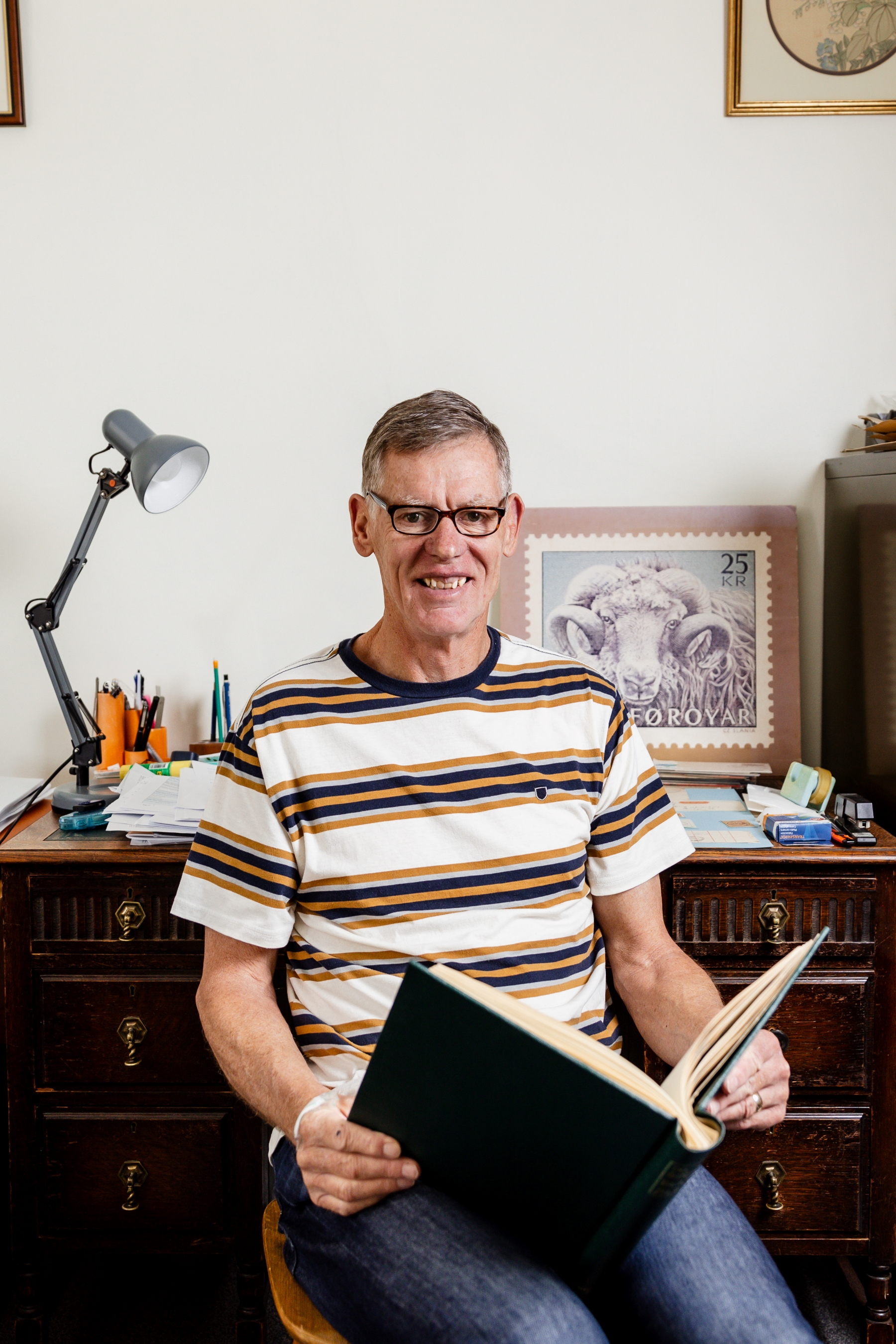Sticking to history: the enduring value of stamps


Stamp collector David Loe with one of his treasured stamp albums.
Two of local philatelist (stamp collector) David Loe’s worlds collided when he worked on the 2017 Kaikōura earthquake rebuild, as a civil engineering project director. Not only did NZ Post release a commemorative set of stamps celebrating the ‘grit and determination’ of North Canterbury Transport Infrastructure Recovery in a series titled Reconnecting New Zealand, but for David, this happy crossover became personal.
Story: Alistair Hughes
“Bless their cotton socks, New Zealand Post reproduced the same set with a caricature of myself added to the stamps and presented them to me,” laughs David. “Not many people get to see those.”
Actually appearing on stamps might seem like the peak of a life-long collector’s life, but in retirement, David is possibly more active than ever.
“I wouldn't say that I was the best competitive philatelist in New Zealand by any stretch, but I do compete every year somewhere in the world, and enjoy it.”
David’s involvement has extended to chairing juries at major shows, and he recently held the position of president of the Association of New Zealand Philatelic Judges.
Like many in this field, David’s passion began when he was young, with a collection his father passed on to him. “He had ended up in Ceylon towards the end of the war, and collected George VI’s Ceylon stamps. I will say though, I didn't find them terribly interesting.”
But they were still enough to ignite the young David’s enthusiasm, particularly for the stamps of a very different island, far to the north in the opposite hemisphere.
“I found Iceland to be a fascinating country, simply because my mother bought me a packet of stamps with volcanoes on them when I was a schoolboy, back in the day. They're pretty attractive, and that's what got me started. Iceland is kind of a living history book, reflected in its history and its stamp issuing, and I've been there quite a few times.”
David and his family immigrated from Britain in 1996, drawn here by the outdoors lifestyle.
After twenty years in Auckland, they moved to Nelson, where he is an active member of local tramping and cycling clubs.
“It probably all began when my wife spent a year in a pharmacy in Queenstown as part of her overseas experience, and then wanted to bring me out here. It was a good outcome.”
Upon arrival, David found the philatelic scene in New Zealand very similar to what he had left.
“I suppose the only big difference for me is that I think, as a nation, New Zealand is quite competitive, and it's the same in stamp collecting because we like to take on the world.”
David’s own collection has developed to the extent that he now enjoys the intellectual challenge of trying to beat the Icelandic collectors at their own game in international competitions.
But exactly how does one philatelist compete against another, and how are exhibits judged?
“There are about seven criteria to be judged against, a bit like a business case,” David explains. “One category is ‘treatment’ (defined as ‘the organisation and development of the exhibit subject’). For example, if an exhibit relates to the development of the Nelson district postal service, how well has that story been told?”
There is also a rarity category, and marks are awarded for the condition of the collection.
“So don't put in a tatty postcard with its corners missing. Get the best quality Frederick Nelson Jones postcard of Tākaka or whatever you're trying to show, and mount it carefully, because you also get marks for presentation.”
Marcophily is an adjacent discipline which deals specifically with the collection of postmarks.
“And with a marcophily exhibit, you're trying to display a very clear postmark where you can read the date and office and things like that. Another criteria is knowledge: how much information you display without writing too much.”
David also stresses that his own collecting interests expand beyond stamps.
“Much of what I collect is material that's gone through the post, but doesn’t necessarily have stamps attached. Some of my earliest Icelandic items are from before they even had a postal service.”
He explains that mail was carried privately, often entrusted to ship’s captains to be carried where it needed to go. Nine times out of ten, he says, you can even find out what was in the letter or parcel. These windows into the past create much of the interest for David, including the history of postal services here.
“Especially when you consider that every post office was also effectively the local bank, social credit agency and fulfilled so many other needs of the local community.
So, trying to discover photographs that match in with the dates and then linking them to the postmark is pretty interesting.”
Promoting our region's local history, the Philatelic Society joined forces with the Genealogical Society and Waimea South Historical Society to hold a ‘Collecting History’ event at Founders Heritage Park in October.
“We exhibited collections, but not for competitive judging, we were really showcasing the sorts of things that we do. We got quite good numbers through, and everyone had a fun time.”
A side interest of David’s has become military mail, and specifically that of a local unit: the 12th Nelson/ Marlborough regiment.
“They gathered at Tapawera Military Camp every year for training. Trying to recover mail from that training camp has become one of my challenges. And when on active service, overseas soldiers could send their mail free of charge, and that was one way of keeping people sane - to send letters.”
This coming March, there will be a national show in Palmerston North, with around 120 collectors from around the country competing. As interest in history sometimes increases with age, perhaps newer generations will discover philately eventually?
“I think that's certainly true. For a lot of people, it starts with personal family history, and then off you go, chasing whatever that leads you to. For an older generation, it's actually a really good hobby to have, because you can do it from home regardless of what the weather's doing, and it needn't cost a fortune. The internet certainly helps in searching for material, regardless of it leading to the demise of stamp collecting.”
Every email may replace a mailed letter, but David takes some comfort in the fact that New Zealand Post are still producing stamps, even if other postal administrations no longer do so.
“Enthusiasts such as me are still out there, doing our bit, and still making new discoveries.”
